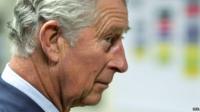
The Supreme Court says letters by Prince Charles to the government can be published, after a Guardian campaign.
The UK's highest court was asked to judge whether the Attorney General's office acted unlawfully when it prevented their publication in 2012.
The newspaper sought disclosure of the letters, written to seven government departments between 2004-5.
The prince's office at Clarence House said it was "disappointed the principle of privacy had not been upheld".
A spokeswoman also said the issue was "a matter for the government".
The government wasted hundreds of thousands of pounds trying to cover up these letters
Prime Minister David Cameron called the ruling "disappointing" and said the government would now consider how best to release the documents.
He added: "This is about the principle that senior members of the royal family are able to express their views to government confidentially. I think most people would agree this is fair enough."
The BBC's royal correspondent, Nicholas Witchell, says the government now has 30 days to prepare the publication of the 27 letters which have been cleared for publication.
It has been argued that releasing the so-called "black spider memos" - a reference to the prince's handwriting - would undermine his neutral political status.

Analysis
By Peter Hunt, BBC diplomatic and royal correspondent
What was once private, will now - at some stage - be very public.
A future king's letters to seven government ministers - written, no doubt, in his distinctive style which includes plenty of underlinings and exclamation marks.
We have a sense of what they might contain. The former attorney general has described them as particularly frank and he said their publication could lead the public to interpret them as disagreeing with government policy at the time.
Those around the prince insist the contents are relatively benign and they are relaxed about their eventual publication.
Given his passion and his history of conveying blunt messages, some of Charles' letters will, at the very least, raise the odd eyebrow.
His challenge is that their release will focus attention once again on how he operates, so close to the throne.
Prince Charles divides opinion as heir.
Will he be, and can he be, a unifying monarch?
Read more on Peter Hunt's blog.

The Guardian said it had been "pressing the government" for 10 years to see the letters and Alan Rusbridger, editor-in-chief of Guardian News and Media, said he was "delighted" by the ruling.
"The government wasted hundreds of thousands of pounds trying to cover up these letters, admitting their publication would 'seriously damage' perceptions of the prince's political neutrality," he said.
"Now they must publish them so that the public can make their own judgment.
"This is a good day for transparency in government and shows how essential it is to have a fully independent judiciary and free press."
According to previous Attorney General Dominic Grieve, the letters contain the prince's "most deeply held personal views and beliefs".
Legal battles
The prince is heir to the throne and, as the royal family's own website explains, it is central to the British constitution that the reigning monarch should remain politically neutral.
Mr Grieve has also said that any perception the prince had disagreed with the then Labour government in 2004-5 "would be seriously damaging to his role as future monarch because if he forfeits his position of political neutrality as heir to the throne, he cannot easily recover it when he is King".
Guardian journalist Rob Evans originally applied to see letters under the Freedom of Information Act 2000 and the Environmental Information Regulations 2004; this was initially denied by the information commissioner.
But several legal decisions followed:
- In September 2012 the Upper Tribunal ruled that Mr Evans and the public were entitled to see "advocacy correspondence" from the prince (27 out of the 30 letters)
- The seven government departments concerned did not appeal but Mr Grieve, then attorney general, imposed a veto
- In March 2014, three Court of Appeal judges unanimously ruled that Mr Grieve had "no good reason" for using the ministerial veto
Seven justices at the Supreme Court in London have now heard a challenge by current Attorney General Jeremy Wright QC against the Court of Appeal ruling, but that was dismissed, paving the way for the letters to be published.
The Supreme Court considered by a majority of five to two that the attorney general was not entitled to issue a certificate under Section 53 of the Freedom of Information Act - known as a veto - "in the manner that he did", and ruled that the certificate was "invalid".
Lord Neuberger concluded that Section 53 does not permit the attorney general to override a decision of a judicial tribunal or court by issuing a certificate "merely because he, a member of the executive, considering the same facts and arguments, takes a different view from that taken by the tribunal or court".
This would be, he said, "unique in the laws of the United Kingdom".
Anda sedang membaca artikel tentang
Court allows Charles letters release
Dengan url
http://beritaberbagiceria.blogspot.com/2015/03/court-allows-charles-letters-release.html
Anda boleh menyebar luaskannya atau mengcopy paste-nya
Court allows Charles letters release
namun jangan lupa untuk meletakkan link
Court allows Charles letters release
sebagai sumbernya
0 komentar:
Posting Komentar